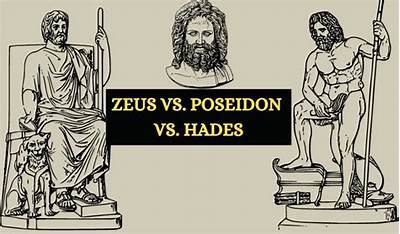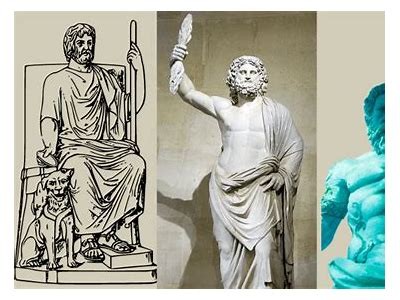A Comprehensive Comparison of Zeus and Hades: Stats, Strengths, and Abilities Explained
In the realm of Greek mythology, few deities have captured the imagination as profoundly as Zeus and Hades. Both brothers, born of the Titans Cronus and Rhea, played pivotal roles in the pantheon of ancient gods, yet their characters and domains differ significantly. This article aims to provide a comprehensive comparison of Zeus and Hades by examining their stats, strengths, and abilities, exploring how their roles in mythology shape our understanding of them.

Before delving into their individual stats and abilities, it’s essential to understand the mythological context surrounding Zeus and Hades. Zeus, often referred to as the king of the gods, presides over the sky and thunder. On the other hand, Hades is known as the god of the underworld, ruling over the dead and safeguarding the riches of the earth.

Zeus is often portrayed as the most powerful of all gods. His attributes include:

Zeus’s physical and divine prowess allows him to unleash storms, create thunder, and exert influence over other deities and mortals alike. As the supreme deity, he commands respect and power.

In contrast, the attributes of Hades emphasize his role as the overseer of the underworld:

Hades’s domain is not to be perceived as evil, despite often being associated with death. Instead, he ensures order in the afterlife and guards against chaos. Strengths and Abilities Comparison Zeus’s Abilities
Zeus possesses a range of formidable powers that highlight his status as the king of gods: - **Weather Manipulation**: Zeus can summon storms, rain, and lightning at will, making him a crucial figure to mortals who depend on agriculture and weather. - **Combat Skills**: With extraordinary physical strength, Zeus can contend with Titans and other formidable opponents, showcasing his prowess in battle. - **Divine Influence**: He can influence the fates and actions of mortals and even other gods, reinforcing his authoritative status. Hades’s Abilities
While Hades may not engage in the same grand displays of power as Zeus, his abilities are equally significant: - **Control over the Dead**: Hades can summon and bind spirits to serve him, ensuring his authority over the underworld remains unchallenged. - **Wealth Control**: He governs the riches found beneath the earth, which grants him influence over prosperity and abundance. - **Protections of the Underworld**: Through Cerberus and other forces, Hades safeguards the dead from escape, representing order in the afterlife. Impact on Mythology and Culture Zeus in Culture
Zeus has been depicted in countless stories, artworks, and literature, often embodying strength, authority, and paternal guidance. His character represents a blend of human traits and divine power, which has resonated across cultures. Zeus’s relationships, such as those with Hera and other figures, underline themes of love, betrayal, and vengeance, which are common in human experiences. Hades in Culture
On the other hand, Hades often suffers from a reputation colored by misunderstanding. Many view him merely as the grim reaper of Greek mythology. However, his stories reveal a more complex character, one that symbolizes the inevitability of death and the importance of the afterlife. Modern interpretations often highlight Hades’ protective qualities and his role as a guardian rather than a villain. Conclusion
In summary, both Zeus and Hades are vital figures in Greek mythology, each representing different aspects of existence. Zeus, the king of the gods, signifies authority, power, and the forces of nature, while Hades embodies the finality of death, order in the afterlife, and the wealth of the earth. Their differences and similarities offer a rich tapestry of themes that have persisted through centuries, influencing literature, art, and cultural perceptions of life and death. Related Tags
Unless otherwise specified, the copyright of this article belongs to WillBet: Your Gateway to Premier Online Betting All, please indicate the source for reprinting.
Category: fist of destruction
Title: A Comprehensive Comparison of Zeus and Hades: Stats, Strengths, and Abilities Explained
Related
Related Sites
- 最近发表
-
- Discover Exciting Backseat Gaming Slots Online for Ultimate Fun and Big Wins
- Lothar Matthäus Career Achievements and Partnership with Interwetten Explained in Detail
- Latest Updates and Promotions Available Today on Www Interwetten Com Online Sportsbook Platform
- Discover the Ultimate Betting Experience with Www Willbet 288 Online Platform for Reliable Sports Wagering
- Top Online Casinos for Real Money in 2024 Best Trusted Gambling Sites Reviewed
- Discover the Ultimate Willbet Slot Experience with Exciting Features and Big Winning Chances
- Discover the Ultimate Casino Experience with 1xbet Online Platform for Secure and Exciting Gambling
- Comprehensive Review of 22Bet Casino Featuring Games Bonuses and Secure Payment Options
- Discover How to Maximize Your Winnings with Fanatics Casino Free Play Offers and Bonuses Online
- A Comprehensive Overview of the Interwetten Logo Design Elements and Brand Identity
- 标签列表
-
- online-casino (26)
- live-dealer-games (13)
- sports-betting (65)
- online-gambling (25)
- promotions (20)
- gaming (13)
- online-gaming (32)
- casino-games (42)
- online-slots (16)
- responsible-gaming (16)
- bankroll-management (15)
- responsible-gambling (32)
- Interwetten (67)
- online-betting (62)
- customer-support (16)
- Willbet (15)
- Online-Gambling (21)
- Sports-Betting (26)
- Online-Gaming (24)
- live-betting (19)
- Casino-Games (24)
- mobile-gaming (28)
- betting-strategies (15)
- Online-Betting (24)
- casino-bonuses (17)